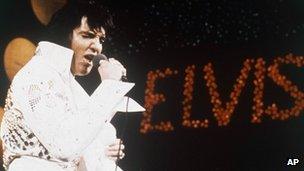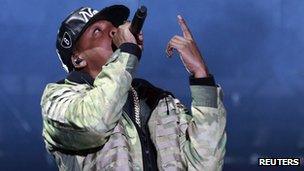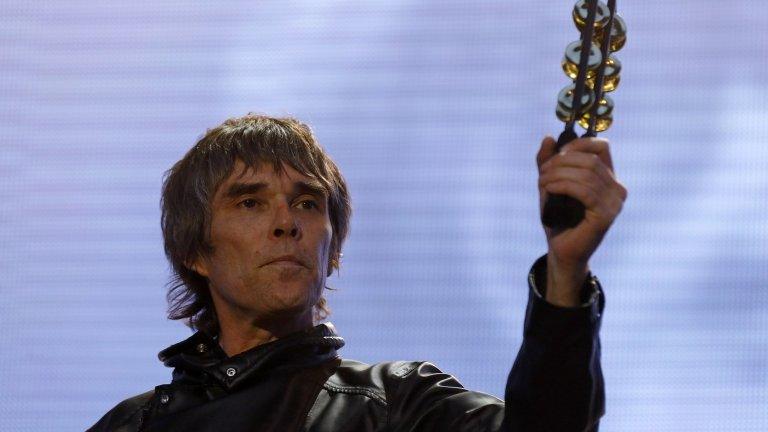Festival business is no walk in the park
- Published

A good experience is as important as the acts, festival organisers say
"Even if you get Elvis Presley and the Beatles resurrected and playing," says Geoff Ellis, "people won't come back unless the experience is good."
Ellis is in charge of DF Events and Concerts, meaning he's been in charge of T in the Park for the past 11 of the 19 music festivals.
He can take a lot of the credit for building up its musical credibility, having previously been a key figure in building up the Glasgow music scene.
He still runs King Tut's Wah Wah Hut.
Before that, the Stone Roses were one of his first bookings as a student entertainments officer, and they're back again this week at the Kinross-shire festival.
But what's also notable about T in the Park is that Ellis makes it work as a business. And as other festivals have proven by coming and going, that's not always easy.
The secret, he says, is to do your business planning first, then book the content or "manufacture the product, if you like".
But a music festival requires more than merely 200 bands playing on a range of stages around the disused Balado airfield.
"The main priority has to be the customer," says Ellis.
"Festivals are about experiences. You create a magical wonderland. You transport yourself away for the weekend. If it's not magical, people won't come back."
At £200 for a three-day camping ticket, they do come back.
With capacity of 85,000, T in the Park ticket sales were slow this year, but not as slow as other festivals.
And that's with several of them taking a year out while the necessary resources of portable toilets, fencing and security are being soaked up by the Olympics in London.
That's partly because T in the Park has become a rite of passage for Scottish youth. Groups of school leavers empty their piggy banks to get there.
It leaves the business challenge of how to grow the business without gouging the customers for more when they get there.
"That's not festival culture," says Ellis. "That would turn off your audience."
International reputation
Yes, there are a range of food concessions, and Tennent's does nicely out of lager and cider sales. This year, one new innovation is the bloke renting out wheelbarrows to help people get their gear into the campsite.
But the way to grow the DF business has been with more sponsorship, and to move into other events management.
Ellis was the man who staged the Papal Mass in 2010, using all the same kit and skills he'd learned from T in the Park, but leaving the Catholic Church to take the risk on getting the crowd in.
He's bidding to put on the opening and closing events of the 2014 Commonwealth Games in Glasgow.
While you might think the international reputation of T in the Park would attract more people from beyond the Tweed, nevertheless the proportion of tickets sold to Scots has risen.

Jay-Z and other big name acts have changed how they operate
The impact beyond Scotland is therefore through the BBC's filming of it. And it reaches a long way.
Tennent's, which has the kind of product placement beyond most other marketers' dreams, is using the international reach to back its marketing push into North America.
The brewers' George Kyle keeps busy over the Balado weekend with corporate hospitality, and also talks of the competitions being run in Canada offering to bring people to Kinross-shire as part of a Scottish holiday.
Will Page, chief economist with the Performing Rights Society, told BBC Scotland he hears about the T in the Park reputation when at conferences from Germany to the US.
He says: "It's grown over the past decade to be one of the biggest there is, and equally it's lifting the festivals around Scotland too.
"There are a handful in the Highlands, not just RockNess, down to the Borders in the Peebles and south-west Scotland. T in the Park has made a huge contribution to growing the market."
He says the calendar has extended too. This is no longer just for summer.
And given the sodden state of this British summer, why should it be? Music festivals now extend from May to October, says Page.
In response, many bands are now building their tours around festivals, rather than going for individual concerts.
Stadium concerts
A band that might play to 800-capacity arena, is choosing "between 800 of your loyal fans who know the words to your songs, or 60,000 strangers in field who might pick up on the words if the chorus is good enough".
The top end of the business is the heritage band, or at least those who can fill huge stadiums and arenas. Their touring has changed as well.
It's not just that this is the way they make their money, having replaced CD sales. It's also that the scale of their stage sets is so big that they are locating themselves for several nights in one venue, requiring fans to travel.
So fans of Bon Jovi, Jay-Z and Kanye West have to go to London's O2, rather than waiting for them to come to town.
Birmingham or Manchester can also attract tours, but it is getting tougher to persuade promoters to bring these performers north of the border.

The new Hydro Arena will open next year
Page reckons one good piece of news for the music industry is the Hydro Arena now under construction next to the SECC in Glasgow.
With more than 12,000 seats, that ought to attract acts. And the acts won't clash with others - exhibitions or comedians - who want to use the other SECC spaces.
Page's analysis of the market suggests Scotland is punching well above its weight in music festivals, up by 184% between 2006 and 2011.
Business is up 52% in stadium concerts during that time.
But the arena acts are down by 6% over that time.
According to Ellis: "It's no secret within the industry that promoters are squeezed far more than before. That's partly because the artists aren't making money from the record sales."
He says promoters used to share the proceeds from touring 50-50, but now artists are demanding as much as 90%.
"Everyone wants more of the live pie. And the live pie isn't that big, because costs and risks are so high."
Hear more about the business of T in the Park and the music industry on Business Scotland, BBC Radio Scotland, at 10.05 on Sunday, 8 July, and after that on iPlayer and by free download.
- Published7 July 2012

- Published9 July 2012